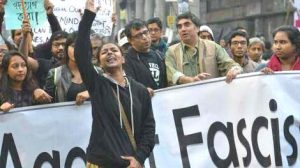
INDIA, January 20—Garment worker comrades in Bengaluru traveled to Chennai to meet auto workers this weekend. Our group had four female comrades, one male comrade and two children. We were very excited to meet our Chennai comrades for the first time.
On the train, we discussed the ongoing mass demonstrations. These started as a rebellion of university students against fascist laws in India, but have turned into mass anger against capitalism. Our discussion focused on communist revolution as the only solution.
In the mass movement, bosses are injecting dangerous alternatives to divide the working class. Liberal politicians preach non-violence in the face of brutal police beatings and constant harassment by the RSS and ABVP fascist militias (both funded by the ruling party, BJP). We need to organize self-defense squads with the outlook of forming a red army to defeat capitalism.
A female comrade argued loudly,” We must organize the whole neighborhood to finish fascist youth when they come to us.” Her voice drew the attention of other passengers who joined the conversation. They were all workers going to visit their families. Almost everybody joined our discussion. Many workers described the violent humiliation they face every day. An older worker said, “If we are united in a large number, they cannot abuse us.” A female comrade who has led a struggle against sexist abuse in her garment factory responded, “Yes, but we need to not only prevent them from violently attacking us, we need to eliminate them forever. That is communism. We need masses of workers like you to join our party, ICWP, so we can build for communist revolution.”
We can write a book filled with stories of workers who are so angry and desperate that a communist alternative brings hope, determination and direction to building our party. Even our 10 and 12 year old children, traveling with us, understood communist politics. They often interacted with passengers to explain why capitalism needs to go.
Eleven comrades met us at the Chennai train station. Although we were meeting for the first time, our common bond of communist revolution made us feel as if we had known each other for a long time. It took two hours for us to reach their homes, where we had a delicious dinner. We overcame the language barriers and started talking seriously about building the party.
Comrades felt that as the crisis of capitalism is deepening, workers can either join the communist path of ICWP or the nationalist/fascist path of keeping capitalism alive with a bloodbath. Our leadership in this struggle for communism is crucial. Reforms to fight for job security, pension plans, health and housing benefits attract many workers to join and fight for unions and political parties. In the midst of this capitalist crisis, these reforms are impossible because the bosses are looking for bigger cuts from the working class so they can compete with rival capitalists. We need to finish them all. That means building a mass ICWP.
We spent two days in Chennai. We read and discussed two articles on dialectical materialism. Many comrades found the reading difficult because we are not used to reading such difficult material. We read everything aloud. This forced us to ask questions and make things clear for each other. We talked about our own work and how we can improve it using dialectics. We felt that our main ideological struggle is against the liberal and fake communist parties who give the illusion that capitalism can be reformed. We estimated that as a collective we have the ability to reach out to thousands of workers with communist ideas.
Our weekend was extremely useful. We need to regularly organize these activities with comrades from other cities. To see comrades from another state who speak different languages was very inspiring. The participation of female comrades along with Dalit, Muslim and other workers, shows that the world is ours and communism is the future.


